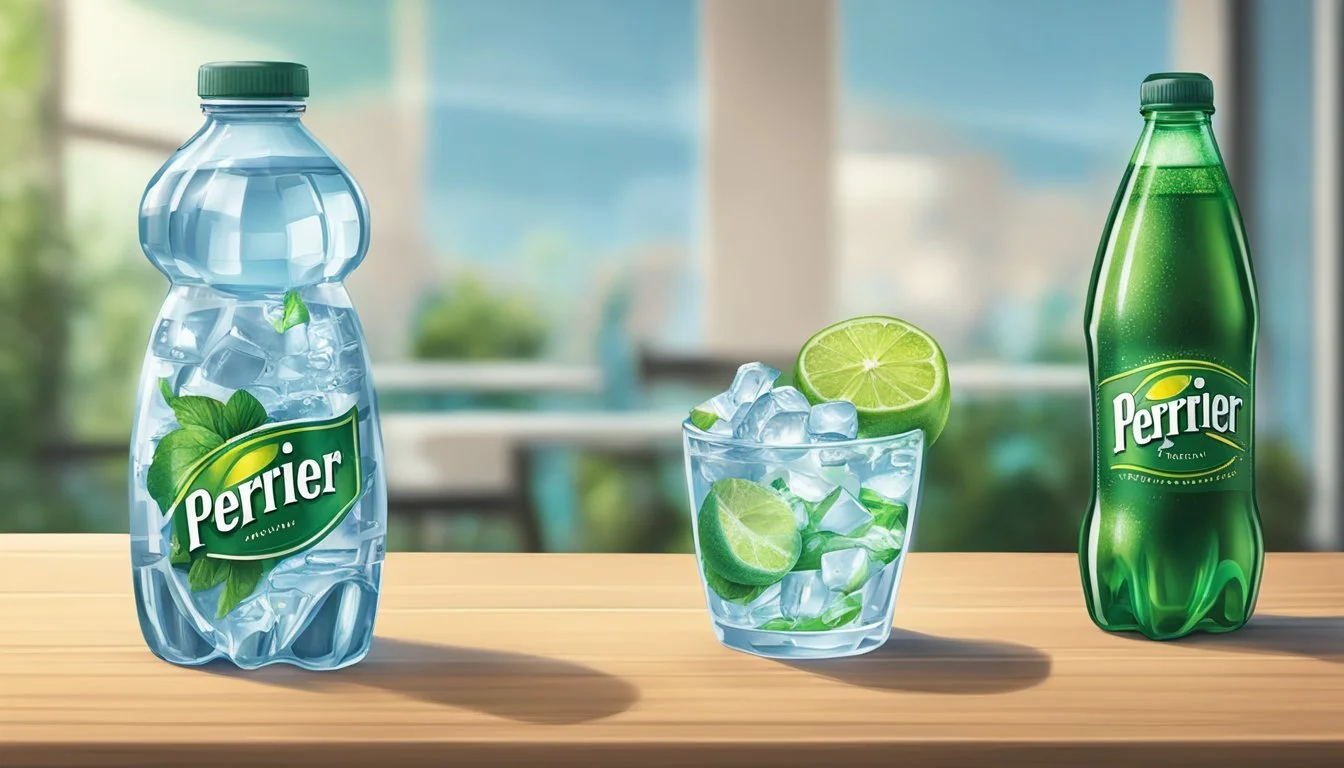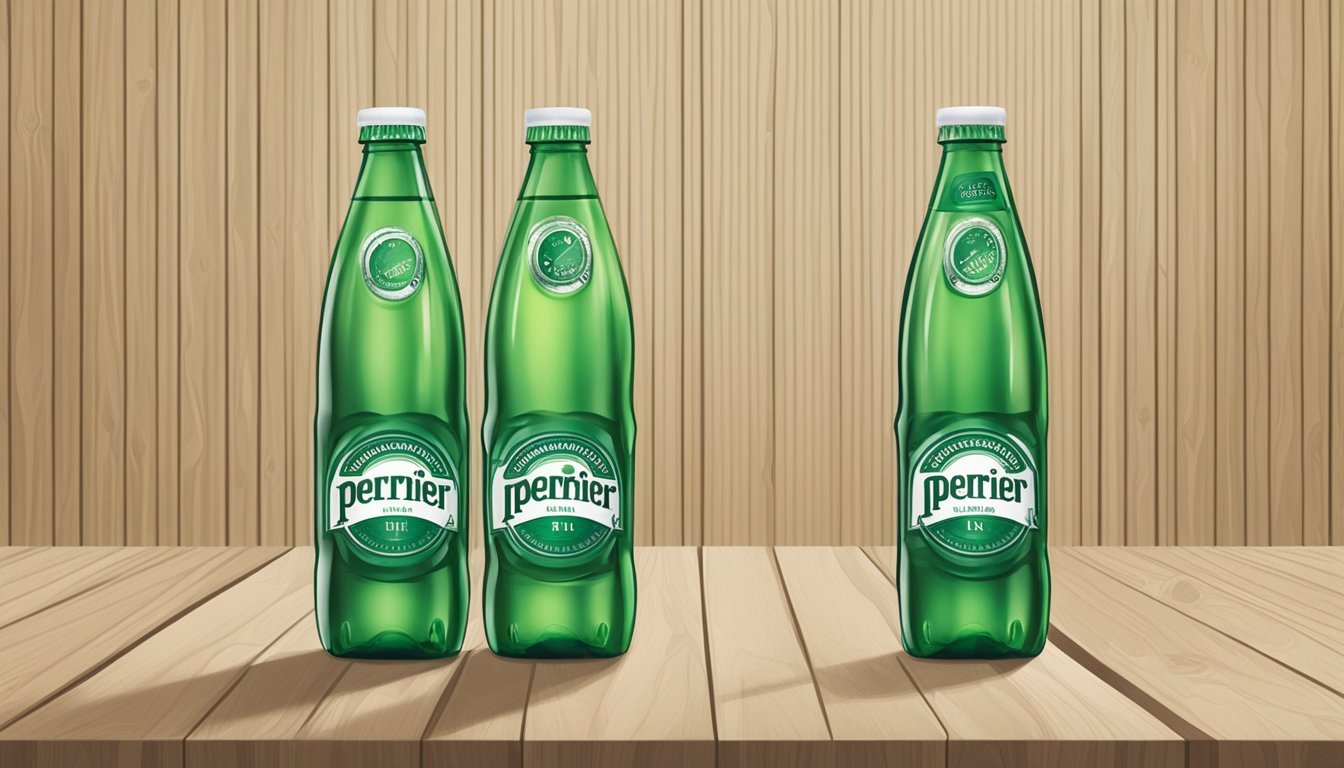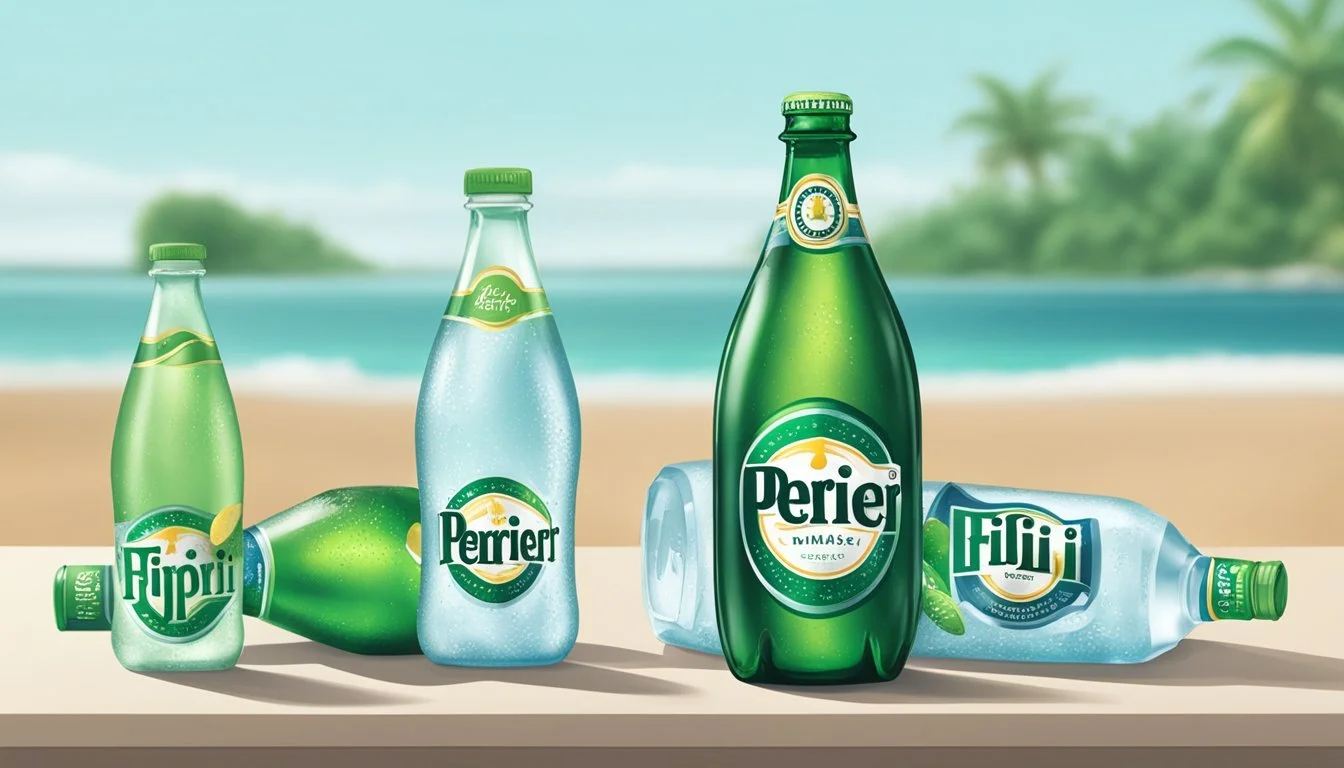Fiji vs. Perrier
A Comprehensive Comparison of Bottled Water Brands
In the realm of bottled water, Fiji and Perrier stand as two prominent brands, each with a distinct identity and market presence. Fiji Water, sourced from an artesian aquifer in the remote Fiji Islands, is known for its soft mouthfeel and unique mineral profile that it acquires from volcanic rock. It touts a naturally occurring high silica content, which contributes to its smooth taste and positions it as a premium option among natural bottled waters.
On the other hand, Perrier is synonymous with sparkling mineral water. Extracted from a spring in the South of France, Perrier's bubbles are naturally occurring, though additional carbonation is added to meet consistency. The brand is distinctive for its bold, effervescent character and has established a reputation as a chic, sophisticated beverage choice. Both brands serve consumers who are willing to pay a premium for their perceived quality, positioning, and taste preferences.
When comparing Fiji and Perrier, factors such as source, taste, mineral content, and environmental impact come into play. While Fiji offers a pure, untouched quality appealing to those who favor still water, Perrier caters to a different palate with its crisp carbonation. Consumers often make choices based on lifestyle, subjective taste, and values, such as environmental sustainability.
Understanding Bottled Water
In considering Fiji and Perrier as bottled water options, it's essential to comprehend the nuances of the bottled water industry, which includes history, available types, and the significance of labels that differentiate spring water from mineral water.
History and Market Evolution
The bottled water industry has seen significant growth over the years. It began in Europe in the 18th century and has become a global market with major players such as Nestlé, Coca-Cola, and PepsiCo vying for dominance. Fiji Water emerged in 1996, capitalizing on its exotic source and premium branding. Meanwhile, Perrier, sourced from the French Alps, has been an established name, known for its carbonation and distinct mineral content.
Different Types of Bottled Water
There's a diverse range of bottled waters available in the market, each with unique characteristics:
Spring Water: Originates from an underground aquifer and must flow naturally to the earth's surface or be extracted through a borehole.
Mineral Water: Contains a higher mineral content, which it must naturally possess at the source; these minerals include calcium, magnesium, and potassium, which are beneficial electrolytes.
Purified Water: Undergoes processes such as distillation, deionization, or reverse osmosis to remove impurities.
Sparkling Water: Infused with carbon dioxide gas, which gives it effervescence.
Understanding Labels: Spring Water vs. Mineral Water
Labels on bottled water can be indicative of its source and contents:
Spring Water: Branded as pure and natural, spring water refers to water harvested from a natural spring. It's often preferred for its taste and minimal processing.
Mineral Water: Recognized for its constant level and relative proportions of minerals and trace elements at the point of emergence from the source, no minerals can be added to this water. Perrier is a famous example of naturally carbonated mineral water from a well-guarded source in the French Alps.
Each type of bottled water offers different benefits and experiences, governed by strict regulations to ensure quality and consistency for the consumer.
Fiji Water: Source and Qualities
Fiji Water is renowned for its exotic origin and distinct flavor profile, which are derived from its unique source and mineral composition.
Fiji's Unique Water Source
Fiji Water originates from an underground aquifer in the remote Yaqara Valley of Viti Levu, one of the two principal islands of Fiji. The water filters through layers of volcanic rock that naturally purify it and enrich it with minerals, resulting in pure Fiji natural artesian water. The aquifer is naturally pressurized, pushing the water to the surface without the need for mechanical pumps. This process also protects the water from external elements, ensuring its purity.
Fiji Water's Mineral Content and Taste
Fiji Water is known for its smooth and soft taste, which is attributed to its specific mineral content and the natural filtration through volcanic rock. It boasts a high level of total dissolved solids (TDS), mainly comprised of:
Silica: adds to the water's smooth mouthfeel
Calcium and magnesium: contribute to its taste and are beneficial to health
The mineral composition is a result of the water's volcanic origins, which imparts Fiji Water with its signature taste. The water's pH level is 7.7, classifying it as slightly alkaline, which can be preferable to those seeking water with minimal acidity.
Perrier: Source and Properties
Perrier is internationally recognized for its unique mineral content and signature carbonation, which are a direct result of its source and natural filtration process.
The French Alps: Perrier's Source
Nestled in the south of France, the source of Perrier mineral water is the French Alps. This location is renowned for its geological composition, which imparts a distinct mineral content to the water that emerges. The water percolates through underground layers of glacial sand where it is naturally carbon filtered before being harvested.
Location: French Alps, South of France
Geological Composition: Glacial sand layers
Perrier's Carbonation and Flavor Profile
Perrier's natural carbonation comes from the volcanic gases that are trapped beneath the source. When water flows through the aquifer, it absorbs these gases, which are then released as effervescent bubbles when the water is bottled. The flavor profile of Perrier is crisp and slightly acidic, partly due to its naturally occurring carbonation, which also preserves the mineral content.
Carbonation: Natural, from volcanic gases absorbed in the aquifer
Flavor Profile: Crisp, slightly acidic
Mineral Content:
Calcium: Contributes to the water's signature taste
Magnesium: Adds mineral quality
Other Minerals: A blend contributing to overall mouthfeel and quality
Health and Safety Considerations
When evaluating bottled water brands like Fiji and Perrier, consumers often consider health and safety as paramount factors. Key considerations include the pH level and its alkalinity, as well as the presence of any potential contaminants. Each factor can significantly impact the quality and safety of the water.
pH Level and Alkalinity
Fiji Water is known for its natural artesian source, which gives it a higher level of alkalinity with a pH above 7.5, indicating its basic nature. Alkaline water is often associated with a smoother taste and some believe it can offer health benefits, though these claims lack conclusive scientific support.
On the other hand, Perrier is naturally carbonated spring water which is characterized by a neutral to slightly acidic pH, typically around 5.5 due to the carbonation process. Some consumers prefer the neutral or slightly acidic taste, especially for the refreshing sensation it offers.
Presence of Contaminants
Concerning the presence of contaminants, it is essential to look at both chemical and physical impurities. Independent testing has demonstrated that some bottled waters contain microplastics but the health implications of this are not yet fully understood.
Fiji Water comes in PET bottles, which are a concern if they contain BPA; however, Fiji Water's bottles are BPA-free, potentially reducing the risk of endocrine-disruption associated with this chemical.
Perrier avoids the issue of plastic-related contaminants altogether by packaging its water in glass bottles. However, Perrier, like many other brands, must ensure safety from potential contaminants such as chlorine and PFAS chemicals, which have been raised as points of concern for bottled waters generally, especially those with carbonation.
Each brand ensures compliance with stringent safety regulations to minimize any health risks associated with contaminants. Consumers should look for recent test results and certifications when determining the safety of their bottled water of choice.
Environmental Impact and Sustainability
When examining Fiji and Perrier bottled water, it's essential to consider the environmental impact and sustainability practices of each. This section delves into their respective bottling processes, carbon footprint, and approaches to packaging and recyclability.
Bottling Process and Carbon Footprint
Both Fiji Water and Perrier have different legacies with their bottling processes and carbon footprint. Fiji Water has made a move to reduce environmental impact by transitioning its 500 mL and 330 mL bottles to 100% recycled plastic within the American market. This shift can significantly lower the carbon footprint by reducing the need for virgin plastic production.
Perrier, known for its carbonated mineral water, traditionally bottles their water in glass, with options in plastic as well. Glass, while having a heavier weight and potentially higher transportation emissions, is endlessly recyclable and may offset its footprint through reduced production impact when recycled properly.
The following outlines the key points related to their bottling practices:
Brand Bottling Material Sustainability Features Fiji Recycled Plastic 100% recycled plastic bottles Perrier Glass & Plastic Glass bottle recyclability
Packaging and Recyclability
Packaging strategy is a critical factor in addressing environmental sustainability. Fiji Water's commitment is indicated through its use of recycled plastic bottles, which speaks to the concept of circular economy—aiming to keep resources in use for as long as possible. Perrier offers its water in both plastic and glass bottles, with glass providing excellent recyclability prospects but necessitating effective recycling infrastructure to realize its potential.
Plastic bottles are ubiquitous due to their convenience and lightweight, but they often contribute to plastic pollution if not disposed of responsibly, which could negatively impact ecosystems. As consumers increasingly favor eco-friendly practices, the recyclability of packaging is an important consideration.
Here are key aspects pertaining to packaging and recyclability:
Fiji Water:
Uses recycled plastic in its packaging.
Reduces the introduction of new plastic into ecosystems.
Perrier:
Offers glass bottles, which are highly recyclable.
Provides an alternative to plastic which may reduce overall plastic consumption when chosen by consumers.
Taste Test: Fiji vs. Perrier
When it comes to bottled water, taste is a pivotal factor for many consumers. This section delves into how Fiji and Perrier stack up against each other based on taste preferences and professional comparisons.
Consumer Preferences and Reviews
Consumers regularly opine on the taste profiles of Fiji and Perrier water. Fiji, sourced from an artesian aquifer in the Fiji Islands, carries a soft, smooth taste and is often described as having a pure and fresh flavor. Perrier, on the other hand, is a sparkling mineral water from France, celebrated for its effervescence and distinctive sharp taste provided by its natural carbonation and mineral content.
Fiji Water:
Descriptors: Soft, smooth, pure
Unique Selling Point: Sourced from Fiji's artesian aquifer
Perrier Water:
Descriptors: Effervescent, sharp, mineral-rich
Unique Selling Point: Naturally carbonated spring water from France
It is not uncommon to find that preference between these two brands splits along the lines of those who favor still versus sparkling water, hence the choice is often subjective.
Professional Taste Comparisons
Dan Gentile of Thrillist conducted a taste test to rank various brands of bottled water. While exact rankings for Fiji and Perrier in Gentile's comparison are not specified, Thrillist is known for thorough taste tests to determine the best bottled water.
In professional taste comparisons, Perrier's carbonation is recognized for adding a sensory level to hydration not found in still waters such as Fiji. Professionals try to take a neutral stance, not allowing any preconceived notions to influence their judgment, often leading to blind testing scenarios where brands are not disclosed until after the tasting is complete.
Professional Observations:
Fiji Water: Noted for its cleanliness and natural taste, devoid of heavy mineralization, which can be preferable for those who enjoy the taste of water in its most unadulterated form.
Perrier Water: Appreciated for its effervescence, with a crisp taste that can also serve to cleanse the palate, making it a popular choice in dining experiences or a preferred option for those who enjoy the sensation of bubbles.
In professional circles, the comparison often becomes a narrative of contrasting preferences between still and sparkling waters rather than a direct contest of flavor superiority.
The Water Connoisseurs' Verdict
When comparing Fiji and Perrier, two of the most recognized bottled water brands, connoisseurs tend to focus on several aspects including taste, source, and mineral content. Each brand offers a distinct experience reflective of their respective sources and processing.
Fiji Water hails from the tropical island of Viti Levu in Fiji. Their water is characterized by its soft, smooth taste, which they attribute to the natural filtration process through volcanic rock. It's rich in silica, a mineral that contributes to Fiji Water's silky mouthfeel. In contrasts, Perrier is known for its bold effervescence, with water sourced from the Vergèze spring in the south of France. This sparkling water is infused with naturally occurring carbonation and minerals from the spring.
Here's a brief comparison:
Aspect Fiji Water Perrier Source Artisan aquifer in Fiji Spring in Vergèze, France Taste Profile Smooth, silky mouthfeel Lively effervescent bite Carbonation Still (non-carbonated) Carbonated Notable Minerals Silica Calcium, magnesium
In terms of rankings, opinions often vary. Some connoisseurs place Fiji Water among the best still waters for its unique mineral profile and taste, while others might rank it as average due to its environmental impact from plastic bottles and long shipping distances. On the other hand, Perrier is frequently among the top picks for sparkling waters, appreciated for its crispness and refreshing bubbles.
As for determining which is better, it largely depends on individual preference. Fiji offers a serene sipping experience, while Perrier delivers a refreshing zest. Enthusiasts of bottled waters weigh the merits of these water brands based on the occasion and their palate's preferences.
Alternative Choices in Bottled Water
While Fiji and Perrier are notable names in the bottled water market, consumers interested in exploring other options have a variety of brands that cater to different tastes and preferences.
Emerging Brands and Trends
Recent trends in the bottled water industry have witnessed the rise of brands emphasizing sustainability and unique packaging. Boxed Water is notable for its eco-friendly carton-based packaging, positioning itself as a responsible alternative to traditional plastic bottles. Moreover, Liquid Death has gained attention for its bold branding, selling 100% mountain water in recyclable aluminum cans aimed at reducing plastic usage.
Options for Different Needs and Preferences
Consumers have diverse requirements when it comes to bottled water, ranging from mineral content to packaging. Here are some brands catering to specific needs:
Mineral-Enhanced Water:
San Pellegrino and Acqua Panna offer sparkling and still waters with naturally occurring minerals.
Smartwater vapor-distilled water includes added electrolytes for a distinctive taste.
Naturally Sourced Water:
Mountain Valley and Icelandic Glacial provide water sourced from pristine natural springs, ensuring purity and a clean taste.
Voss offers artesian water from Norway in stylish cylindrical bottles.
Economical Options:
Nestlé Pure Life and Poland Spring are widely available and offer affordable, purified water choices.
Dasani and Aquafina are examples of purified municipal water sources and are easily accessible.
Functional Water:
Essentia is known for its ionized alkaline water, claimed to offer better hydration.
Core Hydration features a balanced pH and electrolytes, aiming for perfect osmosis with the body.
Eco-Conscious Brands:
Ethos Water, sold at Starbucks, contributes to global water access initiatives.
Deer Park and Arrowhead deliver water in bottles made from 50% recycled plastic, reducing environmental impact.
Sparkling Alternatives:
La Croix has a wide range of flavored sparkling waters, free from sweeteners and artificial ingredients.
Perrier also provides flavored versions of its classic sparkling water for those seeking a different twist on effervescence.
This array of options ensures that there is a bottled water brand to meet almost any consumer's requirement, from everyday hydration to luxurious indulgence.
Conclusion: Which Water Wins?
When comparing Fiji and Perrier bottled waters, consumers consider several factors, including taste, health aspects, and environmental impact.
Fiji is often praised for its soft, smooth taste, which emanates from the natural silica and electrolytes found in its source. Advocates for health might opt for Fiji due to its beneficial mineral content and absence of added preservatives or sweeteners.
Perrier, on the other hand, stands out with its naturally carbonated essence, offering a distinct and refreshing experience. Known for its zero-calorie content, Perrier is a sparkling alternative that suits those looking to avoid sugars or sweeteners typically found in sodas.
In terms of environmental consciousness, both brands have drawn criticism over the use of plastic bottles. However, Fiji's single-use plastic bottles have raised concerns regarding potential endocrine-disrupting effects.
To encapsulate, the decision hinges on personal preference:
Preference for still or sparkling water
Taste profile
Health considerations
Environmental priorities
Neither brand clearly surpasses the other, as each has its strengths. Consumers devoted to still water with a smooth taste and higher mineral content may lean towards Fiji, while those enjoying the vivacious sensation of sparkling water with zero calories might prefer Perrier. The environmental impact remains an important consideration that both brands need to address to appeal to eco-conscious consumers.







